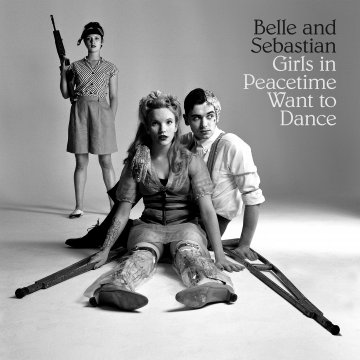
Many things have changed since Belle and Sebastian formed in Glasgow nearly two decades (!) ago — the band’s sound, its composition, the size of its fan base and magnitude of its influence — but their music has retained one essential, appealing quality: kindness. In the band’s world of sound, characters are mostly flawed and sometimes flailing, but never handled with malice or pity; they’re celebrated for their imperfections. That kindness is intact on Girls in Peacetime Want to Dance, the band’s ninth studio album, albeit flavored with political awareness and a sonic adventurousness that’s unprecedented in their discography.
When Stuart Murdoch cobbled together a band for a Glaswegian music business course in early 1996, the music he had been writing was hushed, insular, and tender, and it remained that way for about a half-decade before Belle and Sebastian’s palette started to expand. On mid-career highlights Dear Catastrophe Waitress and The Life Pursuit, Murdoch and co. added spice to their strong melodies and capable arrangements by folding in the sounds of Northern soul, symphonic ’60s pop, and ’70s glam, a tasteful and deft incorporation of influence. Despite that sonic expansion, the band’s songs remained resolutely focused on their interior world, a cluster of relationships and personal exploration that felt detached from anything resembling a larger picture. Belle and Sebastian dealt in songs about love, songs about faith, and songs about Belle and Sebastian; they were detached from any larger narrative, save trifles about potentially gay baseball players. (Summed up in one song, from 2010’s Write About Love: “I’m Not Living in the Real World.”) That’s changed on Girls in Peacetime…, an album where the songs brush up against political turmoil and international strife even as they’re served with typically wry humor. Songs about clubbing are given choruses like “Jump to the beat of the party line,” sleepy reveries are titled “Today (This Army’s for Peace),” and characters like the titular “Allie” find themselves paralyzed by the tumult of the world around them.
The roots of this expanded world view are complex — perhaps equal parts maturation on the part of the band members and aftershocks from last year’s Scottish independence movement, which the band supported — but whatever the cause, it comes with omnivorous sonics to match. Girls in Peacetime… was produced by Atlanta’s Ben H. Allen, a veteran with credits on albums by Animal Collective, Deerhunter, and Bombay Bicycle Club; he has a good hand with bright, rich arrangements. The new direction that’s received the most attention is the band’s turn towards the erudite, silky European dance-pop of the ’80s and early ’90s, as heard on lead single “The Party Line,” disco odyssey “Enter Sylvia Plath,” and the Balearic-flavored “Play for Today.” It’s not a bad look, even if it’s reminiscent of superior work three decades earlier by groups like Pet Shop Boys. But there are other surprising turns on Girls in Peacetime…, from the gaseous dream-pop of Sarah Martin’s “The Power of Three” to the jaunty, percolating middle-aged funk of Stevie Jackson’s strong “Perfect Couples.” It’s an album on which no two songs in sequence draw from the same well, and that makes for a varied and mostly engaging listen. Unfortunately, the experience is somewhat hamstrung by a tendency to sprawl more than necessary; the album clocks in at over an hour in length, and over half of its songs stretch over five-plus minutes. It’s a surprising problem, given that the band can typically tout economy as a strength, with a discography full of albums that are punchy and efficient.
Even with all of the new ground being tread, the album’s one true highlight happens to be the song that hews closest to the simple, warm pop gems that earned Belle and Sebastian a following in the first place. Opener “Nobody’s Empire” contains some of Murdoch’s most personal writing to date, a document of his battle with chronic fatigue syndrome — and subsequent recent relapse — that in turn became part of Belle and Sebastian’s creation myth. (Murdoch wrote much of the band’s early material while grappling with his condition in the early ’90s.) It’s touching and luminous, and serves as evidence of their depth of skill when it comes to pop songwriting; when you’ve been doing something well for twenty years, you develop a knack for pace and scale that emerges organically. The other tracks on Girls in Peacetime Want to Dance don’t always share that natural ease and comfortable size, but their musical diversity and geniality render them worthwhile for listeners amenable to Belle and Sebastian’s particular brand of craftsmanship.
More Must-Reads from TIME
- Where Trump 2.0 Will Differ From 1.0
- How Elon Musk Became a Kingmaker
- The Power—And Limits—of Peer Support
- The 100 Must-Read Books of 2024
- Column: If Optimism Feels Ridiculous Now, Try Hope
- The Future of Climate Action Is Trade Policy
- FX’s Say Nothing Is the Must-Watch Political Thriller of 2024
- Merle Bombardieri Is Helping People Make the Baby Decision
Contact us at letters@time.com